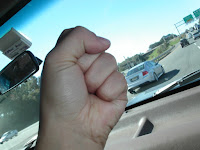When they're busy experimenting with the light and shadow on the tile by the door, their minds are not open to what else is going on... so to them, dad chattering away in the background is like talk radio in a different language that you can hear from someone's passing car.
Linda Clement, Parenting Coach, for parents who want to Thrive, even if it means a little uncomfortable work to make it happen
Tuesday, 1 November 2016
Announce-and-Wait
When they're busy experimenting with the light and shadow on the tile by the door, their minds are not open to what else is going on... so to them, dad chattering away in the background is like talk radio in a different language that you can hear from someone's passing car.
Thursday, 27 October 2016
Say The Right Thing First
 So, instead of feeling like I had to
explain sex and death and taxes and drugs and etiquette and tact
versus lying, or whatever, once and for all... I always knew the
conversation was developing. Developing because the thumbnail answer
any 3yo can absorb at a time isn't ever going to be the way the same
child will comprehend the subject at 8 or 13 or 22 (or 48 or 77...)
and that means the discussion continues more or less where it left
off the next time there is some reason to talk about it.
So, instead of feeling like I had to
explain sex and death and taxes and drugs and etiquette and tact
versus lying, or whatever, once and for all... I always knew the
conversation was developing. Developing because the thumbnail answer
any 3yo can absorb at a time isn't ever going to be the way the same
child will comprehend the subject at 8 or 13 or 22 (or 48 or 77...)
and that means the discussion continues more or less where it left
off the next time there is some reason to talk about it.- I saw in the news
- that movie we just watched
- a story book we are reading
- someone else was talking about it and mentioned a new way (to me) to think about it
- I stumbled upon new information online
- someone else was talking about it and said ______
- your friend is dealing with the same thing now
- another death in the social circle or celebrity media
- I was thinking about what you, I, or they said the last time we talked
- it seemed like the conversation ended abruptly because of some kind of interruption, and we aren't finished with it... so, as I was saying . . . .
Friday, 21 October 2016
Adult View, Child Mind
A brief aside: the Fundamental Attribution Error is a common thought mistake whereby we excuse our own errors (we didn't 'cut off that driver' because they were going faster than we thought or we're just in a hurry which makes it fine or understandable or otherwise completely excusable) yet we attribute character flaws and/or malice to others who do exactly the same things (they are Bad Drivers, they are Selfish, Thoughtless, Idiots, Worthless, Reprobates.)
Becoming aware of this common thought error can help us enormously in life, not the least in preventing our own stress-caused heart attacks. Anyhow... back to the point...
- Is this a Fundamental Attribution Error?
- Is it possible to explain this behaviour in a neutral or positive way?
- Am I attributing adult brain capacities to a child's brain?
- Am I taking personally something which genuinely has nothing at all to do with me?
Monday, 28 March 2016
Magic Calories
 |
| Ice Cream Cones by gordonramsaysubmissions |
What reprehensible property does ice cream have before dinner that it doesn’t have after dinner?
What is this strange ‘ruin your appetite’ thing of which the Grundys of the world speak?
Earlier today, I wrote this in a Facebook discussion:
'What magical property of the calories and nutrients in ice cream at 5:20pm is different from the calories and nutrients in ice cream at 6:45pm?'
Why is popcorn okay at 8:10pm but not 7:45am?
If it's okay to displace x number of calories with nutrition-free (or high calorie, low nutrition density) food, what possible difference can it make to anyone, anywhere, if it is before or after dinner? Or noon? Or the 4th time the earth has rotated around the sun since the cancellation of Firefly?
Monday, 18 January 2016
Basic Triage: deal with the victim's injuries first
Friday, 15 January 2016
Anti-Punishment in a Pro-Punish World
 The long-tail from childrearing in a punishment-happy world is adults who
believe that whenever they make a mistake, damage anything or get anything
wrong, they must be punished: made to feel bad about what they’ve
done.
The long-tail from childrearing in a punishment-happy world is adults who
believe that whenever they make a mistake, damage anything or get anything
wrong, they must be punished: made to feel bad about what they’ve
done.Again.
Yes, that’s what I said: again.
You see, the natural result of doing something wrong, making a mistake, hurting others, doing damage or creating unnecessary costs is to feel bad. Even really little kids get upset when the item breaks, or the baby cries, the dog runs away. I am convinced that this is not something that needs to be ‘taught.’ The natural result of making mistakes or doing damage is self-recrimination, shame, guilt and a loss of self-esteem, and to know that one is capable of harming others (and stuff.)
 Yet it is an article of faith among
the pro-punishment that in order for people to ‘learn’ they must have some kind
of personal harm applied: public censure, fines, thrashings, withdrawal of
affection, restriction of privileges, dragging it up in every
tangentially-related discussion to keep scraping the scab off to keep the wound
perpetually at the top of the victim’s mind.
Yet it is an article of faith among
the pro-punishment that in order for people to ‘learn’ they must have some kind
of personal harm applied: public censure, fines, thrashings, withdrawal of
affection, restriction of privileges, dragging it up in every
tangentially-related discussion to keep scraping the scab off to keep the wound
perpetually at the top of the victim’s mind.Perpetrator’s mind.
Hang on… this is one of the things I find to be problematic about the application of additional punishment: the scale.
Punishment can very rapidly go from ‘harming the perpetrator just enough to match the offense’ to ‘harming the perpetrator so much more than makes sense that the perpetrator is now the victim.’ It is a delicate balance that requires understanding of just how bad the perpetrator already feels, so the additional harm inflicted doesn’t tip the overall experience of the perpetrator into the victim category.
But, wait… if the perpetrator already feels bad, what is the purpose of additional punishment?
I honestly have absolutely no idea.
Monday, 5 October 2015
Parenting is Hard, resisting makes it harder

Everyone who has ever seen one will recognize this as an extreme temper tantrum, and just what they look like in a child older than about 3 (and adults.)
There are a lot of theories about how to handle a child whose brain has gone offline, and who is now fully out of control of all higher level brain functions. My personal favourite means is ‘don’t get there in the first place,’ but sometimes shit happens.
When it happens, it is popular to try to ‘stop it’ by doing common things.
Like the withdrawal of support and affection (sending to rooms, etc.) until the emotional expressions are all happy. Yay drugs! Choose uppers.
Like yelling. Yes, because yelling is going to calm anyone’s brain down.
Spanking has its advocates, because that won’t further overload anyone’s sensory input channels. It may push their brain into a traumatized fugue state, which probably looks like ‘it worked’ to some people who don’t know what that brain state means…
Counter-intuitively, what actually works is describing what is going on, in words.
You are really frustrated because that didn’t go your way.
How infuriating! You just want it to not have broken.
It is really important to you to get the red cup!

It also feels like this will amplify the feelings instead of eradicate them (the goal of the three options most often recommended by ‘experts,’ as listed above) It won’t, and I can tell you why:
When you have room in your world for the expression and understanding of emotions, they don’t hang around. Emotions are like hunger: feel and understand the message of the emotion and it dissipates, just as hunger dissipates with feeding.
So, instead of leaning away from emotions hoping they’ll just go away (or trying to shout them away, ‘cause really: how can that work?) stop resisting.
The emotion is the whole reality for this child right now, with absolutely no room for the child’s tiny body to hold anything else: learning, ‘getting it,’ the message behind punishment, ‘thinking about it,’ or ‘their attention’ to be on anything but this huge emotional reality.
Yes, even if it is something ‘silly’ like the colour of the cup.
It’s not about the colour of the cup, it’s about the feelings provoked by not getting the colour right, by not being able to decide which colour is right or not being allowed or able to pick the right colour, by frustration, disappointment, rage, grief, sadness, fury, and even by simply being totally overwhelmed by having to make a decision that doesn’t matter –again—about an issue that doesn’t matter but that stops the flow of everything until it’s decided.
It’s not about the cup, it’s about the feelings.












